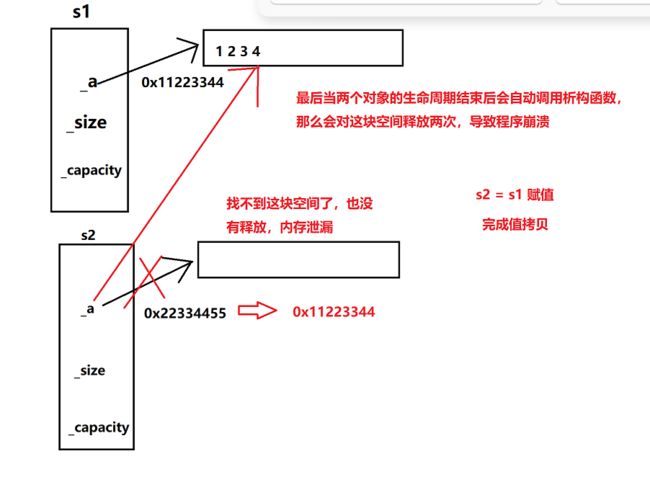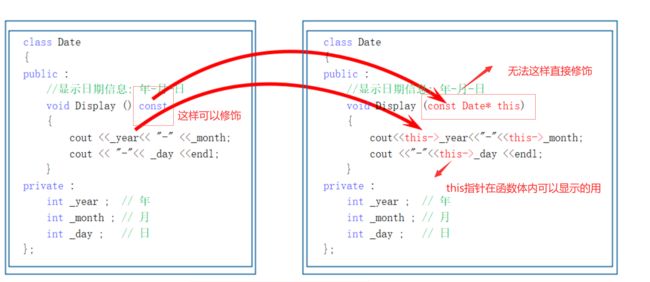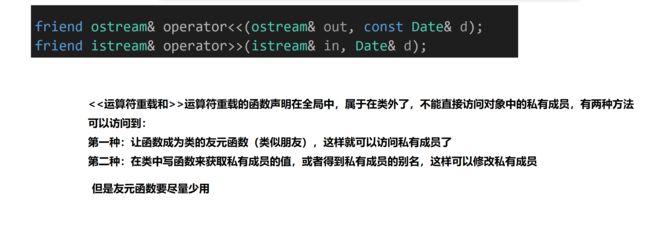C++赋值运算符重载
运算符重载
C++为了增强代码的可读性引入了运算符重载,运算符重载是具有特殊函数名的函数
函数名字:关键字operator后面接需要重载的运算符符号
函数模型:返回值类型 operator操作符(参数列表)
注意事项:
1 不能通过连接其他符号来创建新的操作符:比如operator@
2 重载操作符必须有一个类类型参数
3 用于内置类型的运算符,其含义不能改变,例如:内置的整型+,不 能改变其含义,让它有符号-的功能
4 作为类成员函数重载时,其形参看起来比操作数数目少1,因为成员函数的第一个参数为隐
藏的this
5 .* :: sizeof ?: . 这5个运算符不可重载
赋值运算符重载
赋值运算符只能重载成类的成员函数不能重载成全局函数
原因:赋值运算符如果不显式实现,编译器会生成一个默认的。若我们再在类外自己实现
一个全局的赋值运算符重载,就和编译器在类中生成的默认赋值运算符重载冲突了
用户没有显式实现时,编译器会生成一个默认赋值运算符重载
对内置类型成员:值拷贝(浅拷贝)
对自定义类型成员:调用它的赋值运算符重载
那么再来回顾以下以往的默认成员函数吧:
默认构造函数和默认析构函数:
1 对于内置类型成员:不做处理
2 对于自定义类型成员:调用它的默认构造函数和析构函数
默认拷贝构造函数和默认赋值重载函数:
1 对于内置类型成员:值拷贝(浅拷贝)
2 对于自定义类型成员:调用它的拷贝构造函数和赋值重载函数
拷贝构造和赋值重载的区别:
拷贝构造是用一个已存在的对象去初始化地创建一个新对象
赋值重载是两个已存在对象之间的拷贝
若类中未涉及到资源管理(堆上申请空间),赋值运算符是否实现都可以(编译器默认生成的赋值重载函数足够了),一旦涉及到资源管理则必须要实现
在以下示例中,我没有写赋值重载函数,只有编译器默认生成的,那么会对内置类型成员完成值拷贝,栈是申请空间的,以下程序就崩溃了
//以下程序崩溃
typedef int DataType;
class Stack
{
public:
Stack(size_t capacity = 10)
{
_a = (DataType*)malloc(sizeof(DataType) * capacity);
if (nullptr == _a)
{
perror("malloc fail");
exit(-1);
}
_size = 0;
_capacity = capacity;
}
~Stack()
{
free(_a);
_a = nullptr;
_size = _capacity = 0;
}
void Push(const DataType& data)
{
//CheckCapacity…… 扩容
_a[_size++] = data;
}
private:
DataType* _a;
size_t _size;
size_t _capacity;
};
int main()
{
Stack s1;
s1.Push(1);
s1.Push(2);
s1.Push(3);
s1.Push(4);
Stack s2;
s2 = s1;//赋值
}原因:
所以以上这种有申请资源的情况若是对象之间需要赋值,那么我们就必须自己写,完成深拷贝
const成员
将const修饰的“成员函数”称之为const成员函数,const修饰类成员函数,实际修饰该成员函数
隐含的this指针,表明在该成员函数中不能对类的任何成员进行修改
this指针不能在实参和形参的位置进行直接显示,所以用const修饰this指针的用法比较特殊
一些细节:权限可以缩小、平移 但不能放大
1. const对象不可以调用非const成员函数
这样是权限的放大,const对象不可修改,但是调用非const成员函数的对象是可以修改的
2. 非const对象可以调用const成员函数
这样是权限的缩小,非const对象可以修改,调用const成员函数的对象是不可修改的,权限可以缩小
3. const成员函数内不可以调用其它的非const成员函数
这样是权限的放大,const成员函数的this指针指向的是不可修改的对象,非const成员函数的this指针指向的是可修改的对象,const成员函数若是调用非const成员函数,传递this指针,则让不可修改的对象变成了可以修改,是不行的
4. 非const成员函数内可以调用其它的const成员函数
这样是权限的缩小,非const成员函数的this指针指向的是可修改的对象,const成员函数的this指针指向的是不可修改的对象,非const成员函数调用const成员函数,传递this指针,让可修改的对象变成了不可修改的对象,是ok的
下面我以日期类来演示相关运算符重载的代码实现:
运算符重载的代码实现
下面我会将声明和定义分开,声明在.h头文件中,定义在.cpp中
Date.h:
#include
using namespace std;
class Date
{
friend ostream& operator<<(ostream& out, const Date& d);//友元函数的声明
friend istream& operator>>(istream& in, Date& d);
public:
int GetMonthDay(int year, int month)const;//获取对象的成员月份所对应的天数
Date(int year = 1, int month = 1, int day = 1);//构造函数(初始化功能)
void Print()const;
Date& operator=(const Date& d);//赋值重载函数 其实没必要写,编译器默认生成的会完成值拷贝够用了
bool operator<(const Date& d)const;//<运算符重载函数
bool operator==(const Date& d)const;//==运算符重载函数
bool operator<=(const Date& d)const;//<=运算符重载函数
bool operator>(const Date& d)const;//>运算符重载函数
bool operator>=(const Date& d)const;//>=运算符重载函数
bool operator!=(const Date& d)const;//!=运算符重载函数
Date& operator++();//前置++运算符重载函数
Date operator++(int);//后置++运算符重载函数
Date& operator--();//前置--运算符重载函数
Date operator--(int);//后置--运算符重载函数
Date& operator+=(int day);//+=运算符重载函数
Date operator+(int day)const;//+运算符重载函数
Date& operator-=(int day);//-=运算符重载函数
Date operator-(int day)const;//-运算符重载函数
int operator-(const Date& d)const;//-运算符重载函数(日期类对象相减求相差天数)
private:
int _year;
int _month;
int _day;
};
ostream& operator<<(ostream& out, const Date& d);//<<运算符重载函数
istream& operator>>(istream& in, Date& d);//>>运算符重载函数
Date.cpp
#include"Date.h"
int Date::GetMonthDay(int year, int month)const//获取某年某月的天数
{
static int monthDay[13] = { 0, 31, 28, 31, 30, 31, 30, 31, 31, 30, 31, 30, 31 };
if (month == 2
&& ((year % 4 == 0 && year % 100 != 0) || (year % 400 == 0)))//闰年且是2月
{
return 29;
}
return monthDay[month];
}
Date::Date(int year, int month , int day )//声明给缺省值定义不给 全缺省的构造函数
{
_year = year;
_month = month;
_day = day;
if (month < 1 || month>12
|| day<1 || day>GetMonthDay(year, month))
{
cout << "非法日期" << endl;
}
}
void Date:: Print()const
{
cout << _year << "/" << _month << "/" << _day << endl;
}
Date& Date::operator=(const Date& d)//赋值运算符重载,两日期类对象间的赋值
{
if (this != &d)//自己就不用给自己赋值了,如d1=d1
{
_year = d._year;
_month = d._month;
_day = d._day;
}
return *this;//连续赋值,需要返回*this 如d3=d2=d1(从右边先开始赋值,d2=d1后返回d2,再执行d3=d2
}
bool Date::operator<(const Date& d)const//<运算符重载
{
if (_year < d._year)
{
return true;
}
else if (_year == d._year && _month < d._month)
{
return true;
}
else if (_year == d._year && _month == d._month && _day < d._day)
{
return true;
}
else
{
return false;
}
}
bool Date::operator==(const Date& d)const//==运算符重载
{
return _year == d._year
&& _month == d._month
&& _day == d._day;
}
bool Date::operator<=(const Date& d)const//<=运算符重载
{
return *this < d || *this == d;
}
bool Date::operator>(const Date& d)const//>运算符重载
{
return !(*this <= d);
}
bool Date::operator>=(const Date& d)const//>=运算符重载
{
return !(*this < d);
}
bool Date::operator!=(const Date& d)const//!=运算符重载
{
return !(*this == d);
}
Date& Date::operator++()//前置++
{
*this += 1;
return *this;//this指向的对象函数结束后不会销毁,故以引用方式返回提高效率
}
Date Date::operator++(int)//后置++,int是为了占位,与前置++构成函数重载,以便区分,无需我们传递参数,编译器自动传递
{
Date tmp(*this);
*this += 1;
return tmp;
}
Date& Date::operator--()//前置--
{
*this -= 1;
return *this;
}
Date Date::operator--(int)//后置--
{
Date tmp(*this);
*this -= 1;
return tmp;//temp是临时对象,因此只能以值的方式返回,不能返回引用
}
Date& Date::operator+=(int day)//日期+=天数
{
if (day < 0)
{
return *this -= (-day);
}
_day += day;
while (_day > GetMonthDay(_year, _month))
{
_day -= GetMonthDay(_year, _month);
++_month;
if (_month == 13)
{
++_year;
_month = 1;
}
}
return *this;
}
Date Date::operator+(int day)const//日期+天数
{
Date tmp(*this);
tmp += day;
return tmp;
}
Date& Date::operator-=(int day)//日期-=天数
{
if (day < 0)
{
return *this += (-day);
}
_day -= day;
while (_day <= 0)
{
--_month;
if (_month == 0)
{
--_year;
_month = 12;
}
_day += GetMonthDay(_year, _month);
}
return *this;
}
Date Date::operator-(int day)const//日期-天数
{
Date tmp(*this);
tmp -= day;
return tmp;
}
int Date::operator-(const Date& d)const//日期-日期 返回天数
{
Date max = *this;
Date min = d;
int flag = 1;
if (*this < d)
{
max = d;
min = *this;
flag = -1;
}
int n = 0;
while (min != max)
{
++min;
++n;
}
return n*flag;
}
ostream& operator<<(ostream& out, const Date& d)//流插入运算符重载
{
out << d._year << "/" << d._month << "/" << d._day << endl;
return out;
}
istream& operator>>(istream& in, Date& d)//流提取运算符重载
{
in >> d._year >> d._month >> d._day;
return in;
}
细谈一些运算符重载的代码
< 、==、<=、>、>=、!=运算符的重载
只需要写出<、==或者>、==两种组合种的任意一种组合即可,其他运算符可以直接复用
若是不用友元想得到私有成员的值或者修改私有成员,可以在类中写函数来实现目的
这里函数的声明和定义是分开的
//date.h中
//类中声明
int GetY()const;//获取年
int GetM()const;//获取月
int GetD()const;//获取天
int& Year();//得到私有成员的别名
int& Month();
int& Day();
//Date.cpp中
int Date::GetY()const
{
return _year;
}
int Date::GetM()const
{
return _month;
}
int Date::GetD()const
{
return _day;
}
int& Date::Year()
{
return _year;
}
int& Date::Month()
{
return _month;
}
int& Date::Day()
{
return _day;
}
ostream& operator<<(ostream& out, const Date& d)
{
//out << d._year << "/" << d._month << "/" << d._day << endl;//用了友元
out <>(istream& in, Date& d)
{
//in >> d._year >> d._month >> d._day;//用了友元
in >> d.Year() >> d.Month() >> d.Day();//不用友元
return in;
}






